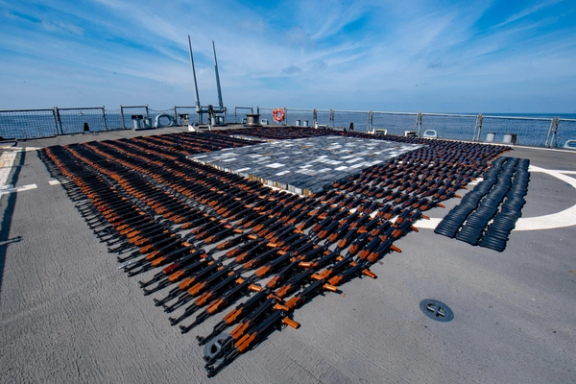US Says To Counter Iranian Threat In Region, After Arms Seizure

The United States said Thursday it will counter Iran’s threat to international and regional security, after an arms shipment to Yemen’s Houthis was seized by the US Navy.

The United States said Thursday it will counter Iran’s threat to international and regional security, after an arms shipment to Yemen’s Houthis was seized by the US Navy.
"Iran’s support for armed groups throughout the region threatens international and regional security, our forces, our diplomatic personnel and citizens in the region, as well as our partners in the region and elsewhere," State Department spokesman Ned Price said in a statement, adding that the US is "committed to countering this threat from Iran".
According to Price, the US has seized dozens of anti-tank guided missiles, thousands of assault rifles, and hundreds of machine guns and rocket-propelled grenade launchers from similar vessels in both May and February of this year.
The United States Navy said Thursday that two of its patrol coastal ships seized a cargo of illicit weapons from a fishing vessel in the North Arabian Sea on Monday. The shipment, the Navy said, included upwards of 1,400 AK-47 assault rifles and 226,600 rounds of ammunition.
The vessel carrying the arms and ammunition originated in Iran, the US Navy said in its statement, adding that the ship was on a route historically used to illegally smuggle weapons to the Houthis in Yemen.
Direct or indirect supply, sale, or transfer of weapons to the Houthi rebels, who are fighting a Saudi-led coalition, is a violation of a UN Security Council arms embargo in force since 2015 and US sanctions. The Saudi-led coalition intervened in the Yemeni civil war in that year to back the country's internationally recognized government which appeared to be losing against the rebels.
Price also warned about the flow of weapons to Yemen saying it enables the Houthi offensive against the southern city of Marib and increases the suffering of civilians while stressing that both parties in the Yemen’s civil war -- the Houthi rebels and the internationally recognized government of President Abdrabbuh Mansur Hadi -- "must reach a political settlement together to end the war".
The war in Yemen is widely seen as a proxy conflict between regional and ideological rivals Saudi Arabia and Iran.
Houthi rebels who blame the Saudis of targeting civilians in rebel areas have also launched dozens of missile and drone attacks on Saudi Arabia in recent years including the attack on Saudi oil establishments in Abqaiq plant and Khurais in September 2019.
Saudi Arabia, the US and some Western countries directly blamed Iran for launching the attack, but Iran has always dismissed the allegations. Iran maintains that it only provides the Houthis with "political and advisory" support and has repeatedly accused the Saud-led coalition of war crimes in Yemen.
A panel of UN experts in a report in February 2020 said some of the new weapons used by the rebels since 2019 had "technical characteristics similar to arms manufactured in the Islamic Republic of Iran".
The UN report cited a weapons shipment seized off Yemen’s coast by the US Navy that included a cruise missile, an anti-ship missile and surface-to-air missiles, and concluded that the attack on Saudi Aramco oil facilities could not have originated in Yemen although the Houthis claimed responsibility for the strikes Tehran denied any involvement.
The earliest shipment of weapons which the US said it had seized from an Iranian vessel headed for Yemen, in 2013, consisted of Katyusha rockets, heat-seeking surface-to-air missiles, RPG-7s, Iranian-made night vision goggles, and artillery systems that track land and navy targets 40 km away.